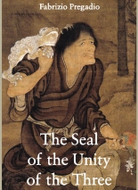Nourishing Inner Nature
The Seal of the Unity of the Three (Cantong qi), Poem 18
Reproduced from:
Fabrizio Pregadio
Golden Elixir Press, 2011
Paperback ● Hardcover ● PDF (abridged)
Under an allusive poetical language and thick layers of images and symbols, the Cantong qi hides the exposition of the teaching that gave origin to Taoist Internal Alchemy (Neidan). In addition to a complete translation, this book contains a detailed introduction to the history and teachings of the Cantong qi, explanations of each of its sections, and notes on its verses.
 This page is part of a series on the Seal of the Unity of the Three. See the complete index.
This page is part of a series on the Seal of the Unity of the Three. See the complete index.
Text
內以養己、安靜虛無。原本隱明、內照形軀。 5 閉塞其兌、築固靈株。三光陸沈、溫養子珠。視之不見、 10 近而易求。
Translation
| 1-4 | Innerly nourish yourself, |
| serene and quiescent in Empty Non-Being. | |
| Going back to the fundament conceal your light, | |
| and innerly illuminate your body. | |
| 5-8 | "Shut the openings" |
| and raise and strengthen the Numinous Trunk; | |
| as the three luminaries sink into the ground, | |
| warmly nourish the Pearl. | |
| 9-10 | "Watching, you do not see it" — |
| it is nearby and easy to seek. |
Notes to Poem
This is the first of ten sections (18-27) that illustrate the main features of "superior virtue" (shangde) and "inferior virtue" (xiade). The import of these chapters is made clear in sections 20-21: superior virtue is the way of non-doing (wuwei), and consists in the cultivation of inner nature (xing); inferior virtue is the way of doing (youwei), and focuses on the cultivation of one's existence (or "vital force," ming) by means of practices such as the alchemical ones.
Translations from the The Seal of the Unity of the Three
● The Lovely Maid of the River
Related pages
The subject of sections 18-19 is the principles of superior virtue. Emptiness is the fundament from which all things arise and to which they return; quiescence is the state required to contemplate Emptiness. The first stanza expresses these principles with allusions to an exemplary passage of the Daode jing: "Attain the ultimate of emptiness, guard the utmost of quiescence. The ten thousand things are brought about together: accordingly, I observe their return. . . . Returning to the root is called quiescence; being quiescent is called reverting to one's destiny; reverting to one's destiny is called being constant; knowing the constant is called being luminous" (Daode jing, 6). The subjects of the present section of the Cantong qi are the same as those of this passage: Emptiness, the return to the root, and the luminous quality of the person who achieves quiescence.
Attaining the state of Emptiness requires closing the "openings" through which we deal with the world of multiplicity. This principle, and its formulation, also originate in the Daode jing: "Shut the openings, close the gates, and to the end of your life you will not toil. Unlock the openings, meddle with affairs, and to the end of your life you will not attain salvation" (Daode jing, 52).
For the Cantong qi, the openings are the "three luminaries": the eyes, the ears, and the mouth, or the functions of sight, hearing, and speech. When the "three luminaries" do not turn their light toward the external world, they "sink into the ground." This expression, derived from the Zhuangzi, denotes the attitude of the saintly man who conceals his sainthood (see the note to verse 7). Established in quiescence, he does not turn himself toward the external objects, allowing the radiance of the luminaries to illuminate and nourish his true Nature (the "numinous trunk"). Maintaining himself in the state of non-doing, he contemplates the arising of all entities and phenomena from Emptiness and their return to it, and nurtures the Pearl spontaneously generated in him by the One Breath prior to Heaven.
This attitude and nothing else constitutes the way of superior virtue and the realized state according to the Cantong qi. As we are reminded with another sentence drawn from the Daode jing (see the note to verse 9), no pursuit is necessary: the Dao is invisible, inaudible, and imperceptible, but is "nearby and easy to seek."
Notes to Verses
4. And innerly illuminate your body. In later times, neizhao ("to illuminate within") became the name of an inner alchemical practice, as seen, for instance, in the expression huiguang neizhao, "circulating the light to illuminate within." From the perspective of the Cantong qi, however, this term does not refer to a practice, or at least not to a practice in the ordinary sense: neizhao describes the state of the realized person, whose inner being is constantly illuminated.
5. "Shut the openings." Compare 58:1-2, which refers to the "three luminaries" as the "three treasures" (sanbao), saying: "Ears, eyes, and mouth are the three treasures: shut them, and let nothing pass through."
7. As the three luminaries sink into the ground. The term luchen ("sinking into the ground") derives from this passage of the Zhuangzi: "[The saint] has buried himself among the people, hidden himself among the fields. . . . Perhaps he finds himself at odds with the age and in his heart disdains to go along with it. This is called 'sinking into the ground'" (25.895).
9. "Watching, you do not see it." This verse is quoted from Daode jing, 14, where it refers to the Dao: "Watching, you do not see it: it is called invisible. Listening, you do not hear it: it is called inaudible. Grasping, you do not get it: it is called imperceptible."
© Fabrizio Pregadio and Golden Elixir Press 2023








